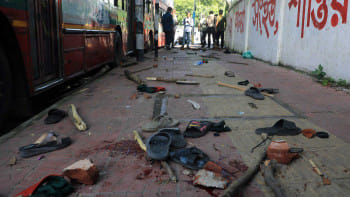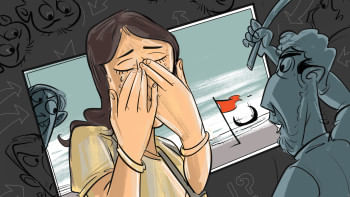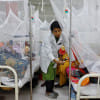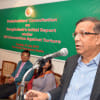We must protect doctors from violence

After a recent attack on a doctor at Cox's Bazar Sadar Hospital, his colleagues reviewed the CCTV footage to assess his handling of the patient. The Intensive Care Unit (ICU) admitted the patient, who had a history of bypass surgery, due to acute left ventricular failure. When his condition worsened, the doctor came in and administered CPR. The nurse was seen preparing an adrenaline injection, as is the protocol. The process failed, and the patient passed away. The attendants met with the doctor. He believed they were requesting an explanation. Suddenly, they started beating him mercilessly. They dragged him down to the ground floor lobby, where the beating could be more spectacular. The stairs remained stained with the doctor's blood. Dr Sajeeb Kazi is now fighting for his life at Chittagong Medical College Hospital (CMCH) with a brain haemorrhage and a rupture of the inner ear membrane.
The incident on September 10 is one of the many instances of workplace violence (WPV) against doctors. Following the tragic death of an accident victim at a private university earlier this month, three doctors from the neurosurgery department of Dhaka Medical College Hospital (DMCH) faced attacks. These incidents are symptomatic of a critical fault line in our healthcare system. They show the risks that healthcare professionals face daily. Doctors face not only the immense emotional and physical pressure of treating patients in a resource-constrained environment, but also the rising possibility of being physically or verbally assaulted.
Unfortunately, violence against doctors is an issue that is neither unique to our country nor recent. This issue is prevalent all over the world. Systemic healthcare challenges, resource constraints, and rising patient expectations contribute to this issue. The emotional stress during medical crises exacerbates the situation further. Due to high patient expectations, doctors in the US have to pay substantial legal fees to protect themselves from lawsuits, and any perceived failure in medical outcomes can lead to costly malpractice claims, regardless of the complexity or inherent risks of treatment.
In Bangladesh, particularly in the current fad of mob justice, it is difficult to guarantee such social and legal succour. The March issue of Bangladesh Medical Journal reflects on this growing concern. Their study on a public hospital found that a staggering 67.3 percent of surveyed physicians reported experiencing WPV last year. Of these incidents, 84.5 percent were psychological in nature—primarily threats and bullying—while 13.5 percent involved physical violence, and two percent were cases of sexual harassment. These findings are similar to those in South Asia. In Pakistan, for example, 53.4 percent of healthcare workers reported WPV, while in India and Nepal, the figures stood at 63 percent and 45.5 percent, respectively.
However, these numbers don't fully convey the agony that doctors endure when they become targets of anger and frustration from people who are at an emotionally charged height of vulnerability. Despite their efforts to keep a critically ill patient alive, doctors may have to give in to the reality of life. Family members of the patients often confront them with verbal abuse or even physical violence, intensifying their efforts against death. The attendants may experience denial, claiming that their loved one did not receive the care they deserved. A lack of understanding of medical limitations and dissatisfaction with the overall care process fuel their unrealistic expectations. Dr Sajeeb Kazi's case serves as an example. For the doctors who endure such violence, the repercussions are severe. Many express a desire to leave the profession entirely or discourage others from joining this noble profession.
It is important for us to examine the causes of this violence. The factors, albeit complex, are not unknown. According to the World Health Organization (WHO), there are only 5.26 doctors for every 10,000 people in Bangladesh. Overcrowded hospitals, a lack of medical supplies, and a shortage of healthcare personnel result in long wait times, rushed consultations, and patient dissatisfaction. Yet, our expectations from doctors run high. They are the last ray of hope, irrespective of the patient's prognosis. Before reaching any conclusion, we must thoroughly judge the charges of perceived neglect or incompetence. Indeed, there can be greedy or negligent doctors, just like professionals in all other sectors.
Hospital administrations need to make efforts to create a friendly, secure environment that allows physicians to work with confidence. The reality is that there are not enough policies to redress WPV. The entire healthcare system suffers when doctors work in fear, and patients ultimately bear the brunt of this crisis. Hospitals must invest in better security infrastructure, including the deployment of security personnel in high-risk areas like emergency wards, installation of surveillance cameras throughout their premises, and restriction of public access to certain areas.
Above all, hospitals must adopt a zero tolerance policy against WPV. Legal responses should be swift and just. The government should clearly articulate national-level policies to protect doctors and healthcare workers. To create a greater sense of empathy and patience, there has to be an awareness campaign. These campaigns can focus on managing patient expectations and understanding the limitations of both medical treatment and palliative care. In addition, The health authorities also must set up a system at all hospitals and other healthcare facilities where patients' complaints of malpractice and other grievances are addressed properly.
Doctors themselves should have their own support services. They can use their collective platform to insist on psychological counselling and emotional support for those who experience violence. All hospital staff should receive training in conflict resolution and de-escalation techniques, helping them manage tense situations more effectively. We should not leave doctors to handle the aftermath of violent incidents alone.
Unless we address the root causes of violence, none of this will be effective. The healthcare system needs significant investment to improve infrastructure, reduce patient load, and ensure that doctors have the time and resources they need to provide quality care. The amount of foreign currency that we lose due to outbound medical tourists can be invested to bring in these systemic changes.
Doctors are our last line of defence when life hangs in the balance. To protect them, we must do everything in our power. Without immediate intervention, we risk losing not just our doctors but also the very heart of our healthcare system. Now is the time for action.
Dr Shamsad Mortuza is professor of English at Dhaka University.
The views expressed in the article are the author's own
Follow The Daily Star Opinion on Facebook for the latest opinions, commentaries and analyses by experts and professionals. To contribute your article or letter to The Daily Star Opinion, see our guidelines for submission.

 For all latest news, follow The Daily Star's Google News channel.
For all latest news, follow The Daily Star's Google News channel. 











Comments